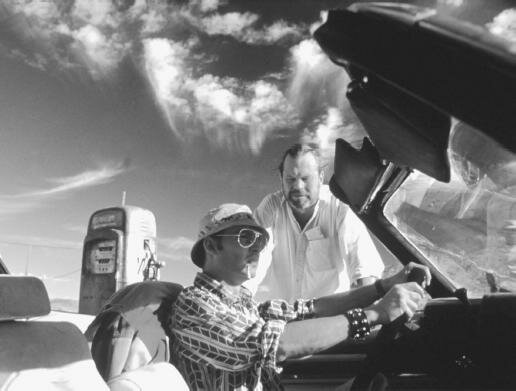 If you’ve known me for a long time, you’d know that I’ve had a profound appreciation for Terry Gilliam for as long as I’ve been able to distinguish between directors. For those who’ve only known me as long as I’ve been movie blogging, I suppose I come off as someone with an axe to grind, clinging to films gone by and shunning any of his new work out of spite. Well, I can think of no better forum than the LAMB’s In the Director’s Chair feature on Terry Gilliam to set the record straight about how his signature style, combined with a mythical sense of humour and infamous sense of artistic integrity have forged my favourite director.
If you’ve known me for a long time, you’d know that I’ve had a profound appreciation for Terry Gilliam for as long as I’ve been able to distinguish between directors. For those who’ve only known me as long as I’ve been movie blogging, I suppose I come off as someone with an axe to grind, clinging to films gone by and shunning any of his new work out of spite. Well, I can think of no better forum than the LAMB’s In the Director’s Chair feature on Terry Gilliam to set the record straight about how his signature style, combined with a mythical sense of humour and infamous sense of artistic integrity have forged my favourite director.
Before I knew what steampunk was, I suppose before there was even anything called steampunk, I was already in awe of Gilliam’s unique style in artistic design. He favours richly adorned vistas shot from odd angles with wide angle lenses to create a distorted and surreal perspective of the world. The resulting look is a fertile visual landscape where the seeds of Gilliam’s imagination can take root. These seeds have sprouted into such locales as Time Bandits‘ Fortress of Ulitmate Darkness, 12 Monkeys‘ time machine, Thompson’s hotel room in the waking light of day in Fear & Loathing, the foyer of Information Retrieval in Brazil, and even Parry’s subterranean lair in The Fisher King.
It’s within these meticulously staged backdrops that fuse the magical and the mundane that the stage is set for Terry to explore the schism between reality and imagination. This theme is best exemplified in Brazil where I’ve always felt the underlying message/moral of the story is the only place a man can truly be free is in his own mind. The film’s oppressive Orwellian regime crushed everything underfoot, despite its baffling incompetence. And everywhere Sam turned, the world was closing in on him, his sole refuge was his imagination. And even when that came crashing down on him when things were at their most bleak – it’s his imagination that comes to his rescue. I think the same is true of real life; the only place you can ever be completely free is in your mind. You’re only as free as you feel.
When not seeking refuge in fantasy, Terry’s humour provides another effective tool to cope with the dreariness of reality. Perhaps its his affiliation with Monty Python, but all of his films are infused with a thick strap of humour, even when things are at their darkest. While it should go without saying that his Python films (The Holy Grail & The Life of Brian) and his subsequent “British Imagination trilogy” (Time Bandits, Brazil & The Adventures of Baron Munchausen) ought to be funny, his darker films like the apocalyptic 12 Monkeys or The Fisher King, a story about homelessness, mental illness and crippling guilt in the wake of mass murder at a upscale restaurant, both enjoy plenty of witty moments of levity, even if they are on the dark side. I think the black humour he employs is what I find particularly appealing, as he broaches serious subjects by using humour, helping a light shine in even the most bleak situation. Because at the heart of everything he does, Gilliam is an optimist – he’d have to be to continue making films in the wake of the disasters that have plagued some of his past projects, most especially The Man Who Killed Don Quixote where injuries and a flood conspired to shut down production (but not indefinitely).

But encountering this kind of drama outside the celluloid frame is nothing new to someone like Terry. His conflict with Universal Studios over the release of Brazil chronicled in “The Battle of Brazil” (which can be found in the Criterion Collection release of the film) amazed me with how he had a fierce integrity to match his irrepressibly unorthodox style. When Universal felt that Brazil’s “downer ending” wouldn’t play well in North America, they commissioned a new happy ending be edited (a version in which many of the dream sequence at the end of the film now take place in “reality”) despite Gilliam’s protests. In the end, Gilliam toured the film in its original form to Universities in the US and went so far as taking out a full page ad in Variety imploring Universal boss Sid Sheinberg to release the film as is. His victory in this battle was our victory – as can be seen if you check out the doctored version included in the Criterion release.

The greatest thing of all about Gilliam is that this isn’t even an exhaustive list. There are all kinds of reasons to explore his work, and plenty of reason to be optimistic about his future work as well. He’s taking a second bite at the Don Quixote apple with Johnny Depp on board, and perhaps seeing this through to the end will get his career back on the incredible trajectory it was on before calamity through him out of my favour back in 1999. For a man of his gifts, anything is possible.










I am hopeful too. He was doing great until he cast Matt Damon! That is what did it! ha ha. I am really hoping he will get back to form soon.
You know, Matt Damon might not have been a good choice, but you’ll notice that Heath Ledger’s involvement was what brought on the bulk of his calamity. Damon and Ledger can share the blame for Brothers Grimm, but Ledger’s death during the production of Doctor Parnassus was a tragedy of Gilliam proportions.
Heartily enjoyed this love letter to your directorial hero. Though we may disagree on how much of a calamity his career may or may not has become over the last decade (I still need to see Grimm and Tideland, for starters), we can certainly agree on the beauty and wizardry of his 80s and early 90s masterpieces. He’s a true original.
Aw, shucks. It was time for a reality check. I’d spent so much time over the past couple years spewing anti-Gilliam vitriol, to the point that people wouldn’t even realize he was my favourite director. It also gave me the chance to say all the things I’d have said on the LAMBcast, without having to defend my statements to anyone’s questions…
I’m with you, dude. I’ve always admired Gilliam for how he always sticks to his guns, and make the movies the way he wants them to be, even if it means the movie stalls for years. He never once compromises his unique vision. You’ve got to admire that.
“Fierce Integrity” has always been my favorite way to describe Gilliam. I think that his dedication to creation might have overtaken his dedication to quality. Still, he remains a hero of mine and always will, no matter what kind of films he winds up making – the man has definitely paid his dues.
Just saw Brazil for the first time on HBO the other night. Now I am going to have to check out the Battle of Brazil. Saw The Rum Diary last week I think it could be Gilliam’s fault that I felt it was so terrible.
Cheers and welcome to the Film Cynics! Hold the phone there, buddy! Mr. Gilliam was not responsible for the middling disappointment of Rum Diary – that was Bruce Robinson’s fault.
Steve I think you misunderstood me. What I was trying to say was the Awesomeness of Gilliam’s Fear and Loathing made Robinson’s Rum Diary appear even worse than it was.
Setting an impossible standard, eh? I can see that – I think I felt the same way about “Where the Buffalo Roam.”